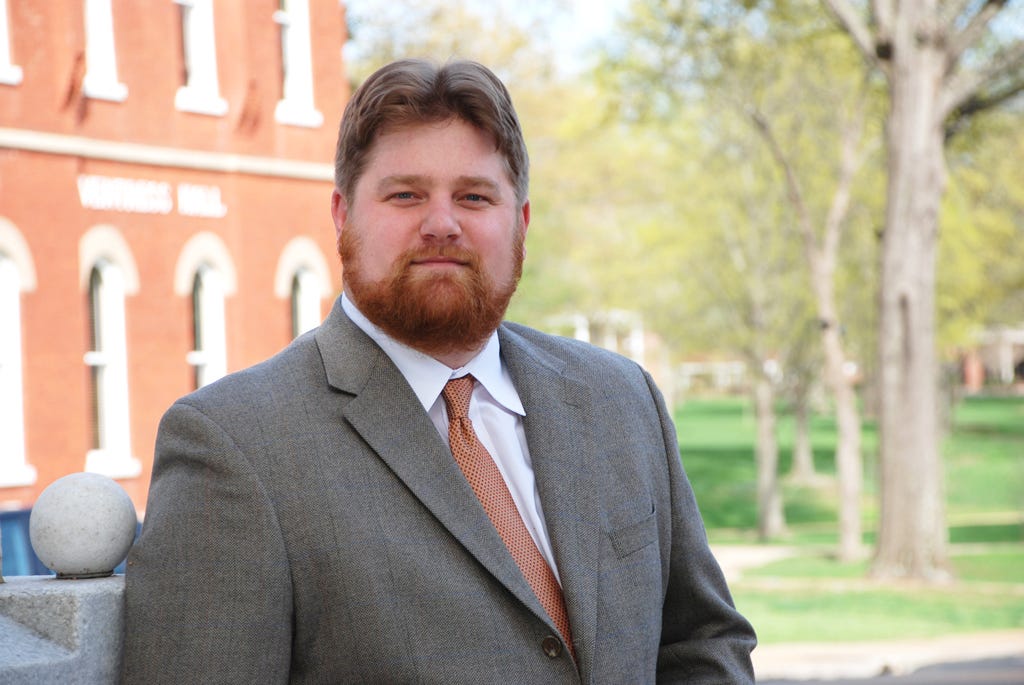This piece was in print under the title "Inmates Need to Be Humanized Through Education." A scan in PDF format is here, and a PDF of the original online version is here.
----------
In the dozen years that I have been teaching, two moments stand out as the most gripping experiences I have had in my classes. With a group of freshmen sitting by the Honors College fountain at the University of Mississippi, we once talked about philosopher John Lachs's book, In Love with Life.
Lachs explains some ways of thinking that are instrumental for living a happy life. We so often focus on things we cannot change in the past, or we worry intensely about the future, forgetting to live in and enjoy the present, he explains.
Just when we had gone over one of Lachs's beautiful passages covering that insight, thin and golden autumn leaves from a tree overhead began to fall slowly all around us, flipping as they descended, as if they wanted to be noticed. I could not have dreamt of a more beautiful illustration of the joy we can find in appreciating the present.
The next teaching moment that stands out most profoundly for me took place in a very different and unlikely setting. Undergraduates at university are energetic, but often need coaxing. I was startled, therefore, to see just how eager and enthralled a group of students would be when I met them at Parchman Prison.
This past Spring, I had the good fortune to witness Louis Bourgeois's memoire-writing course, the Prison Writes Program, put on at Parchman Prison. I served as the outside evaluator for a grant from the Mississippi Humanities Council, which supported Bourgeois and Vox, an incorporated nonprofit in Oxford, MS.
An author and teacher, Bourgeois opened my eyes to how rewarding prison education can be. Parchman's Education Director Nathan Murphree has been very supportive and welcoming, genuinely happy to have opportunities to offer inmates. In the context of recent stories about Mississippi's prisons, we should remember that there are some very good people serving the public in our Department of Corrections.
The men I witnessed in Bourgeois' Spring class were beyond enthusiastic. They were engaged and passionate about writing, excited that their work was to be published in Vox's volume, In Our Own Words: Writing from Parchman Farm (VoxPress.org).
It was clear to me that students in Bourgeois's class were there because of the meaningful experience of taking his course. In a show of seriousness on the prison's part, though, Murphree offered those who complete Bourgeois' course a letter recommending a 30 day reduction to their sentence.
In a separate effort, Dr. Patrick Alexander and Dr. Otis Pickett started up the Prison-to-College-Pipeline at the University of Mississippi, offering inmates – students – college credit for coursework delivered in the prisons. There is a burgeoning movement for prison education in Mississippi and its prospects are highly promising.
Educating an inmate humanizes a person. Student-inmates intensely feel incarceration. What is needed in our prisons is genuine correction, the real educational effort to treat inmates as human beings capable of redirected behavior and of a meaningful future.
It is commonly thought that what inmates need is job training, vocational education. A 2002 study of prison education and recidivism found, however, that "completion of vocational-technical training while incarcerated was linked to shorter survival times" outside of prison, compared with broader educational programming, like GED and humanistic studies.
These results might seem counterintuitive, but they make sense. Learning how to fix a car is handy, but does not address values and the decisions we make. Of all subjects, I believe that ethics could be among the most enjoyable, transformative, and useful courses we could bring to the prisons. In the big picture, however, it is the humanities which humanize. They explore what it means to be a person, what sort of thing society is, and how we might best think about our participation in it.
When Bourgeois taught in Parchman a second time, he invited me to lead one of his class meetings in October, an experience I had the honor of repeating in December. I jumped at both opportunities.
My background is in Philosophy. I suggested covering the material that has most helped me think through hard times – Epictetus's stoicism. Obsessing about things you cannot change is a sure recipe for misery, he explains, as is blaming others for matters in your control. Epictetus teaches us to focus on what is in our control and to accept what is not. The students at Parchman picked up immediately on the fact that the wisdom we call for in the Serenity prayer is the central stoic insight.
The daunting issue in talking about stoicism was that Epictetus believed that freedom and happiness are always in your control. That message might not go over smoothly in a prison setting. Epictetus teaches that if you accept all that is not in your control, you are free and will be happier, focusing on what is in your control. To my surprise, the students in the class agreed almost unanimously. Since the class did not uniformly agree with Epictetus, we still had the rich interaction that I was hoping for, yet the men were mature, thoughtful, and appreciative of what seemed profound and right in the ancient philosopher's writings.
The inmates I met were engaged. They had not only read the material but had prepared notes about it. Some had printed encyclopedia materials about Epictetus for extra background reading – likely with Murphree's support. As we talked about particular issues, students would note how one point related directly to another that Epictetus had raised elsewhere. We moved to read that other passage. It was a class discussion which equaled my richest and most rewarding taught under the trees in the Grove.
These men were experienced. They took the discussion seriously. They understood how abstract ideas have direct relevance for real life. Unlike bored teenagers, these guys needed no convincing of the value of our discussion.
My experience in December was equally great. These men were fully engaged in a discussion about Jean-Paul Sartre's essay, "Existentialism Is a Humanism," in which the philosopher asserts that people are radically responsible for their choices, and in choosing, proclaim their values. The student-inmates' reactions were sophisticated, interested, and compelling.
It is vital that we not underestimate inmates' potential and intelligence. Plato believed that philosophy should ideally be studied when one has reached 50 years of age. Before that we are inexperienced and preoccupied with life's expediencies.
As an advocate for education, my initial inclination is typically to focus on primary and secondary schooling, as well as on higher education – ideally to keep people out of prison in the first place. That mission can be advanced, however, while still valuing and believing in the potential for prison education.
Inmates want the chance to grow and learn like the rest of us. Working with them is hugely rewarding. If we treat them with respect and if we support meaningful educational opportunities for them, our recidivism rate will decrease and we will save a great deal of money over time. As much as we can, we ought to nurture the germinating prison education initiatives in Mississippi. The movement promises to build citizens' self-respect and sense of their own positive power to pursue meaningful lives upon release.
Eric Thomas Weber is associate professor of Public Policy Leadership at the University of Mississippi and author of Democracy and Leadership (2013) and the forthcoming Uniting Mississippi (2015). He is representing only his own point of view. Follow him on Twitter @erictweber. Contact him at his website, EricThomasWeber.org.






